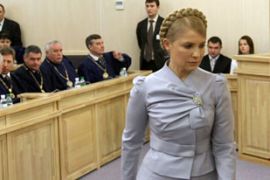Ukraine PM voted out of office
Deputies pass motion of no confidence in Yulia Tymoshenko’s government.

The president’s party is currently the biggest bloc in the chamber with 171 seats, but is well short of the required 226 majority.
Economic crisis
Oleksander Yefremov, a senior Yanukovych ally, said there was “no need to rush” to form a coalition.
“From my point of view, either this week or next we will complete the process of forming [a coalition],” he said.
The fractious nature of Ukraine’s parliament and the limited powers of the presidency will not aid attempts to form a new coalition.
Any new government will be faced with a debilitating economic crisis that saw GDP contract by 15 per cent in 2009.
It will also have to restart talks with the International Monetary Fund (IMF) on the resumption of a $16.4bn bailout package.
The IMF kept the Ukrainian economy afloat last year by paying out $11bn of the package, but it suspended the programme at the end of last year because of broken budget promises.
Constant disagreements
Tymoshenko’s coalition, formed in December 2008, was loosely centered around the political ideals of the Orange Revolution, a series of massive street
protests in 2004 led by former president Viktor Yushchenko and Tymoshenko.
The protests resulted in the Supreme Court overturning Yanukovych’s election victory in 2004, and Yushchenko won a revote, with Tymoshenko as his prime minister.
But their constant disagreements and inability to deliver on promises of European integration and economic growth helped to fuel Yanukovych’s comeback.
Ukraine is largely split between a Russia-leaning east and south and a Western-friendly west and centre.
Though promising to work with the West, Yanukovych is expected to tilt the former Soviet republic back towards Russia, the source of the gas sent through Ukraine to supply central and western Europe.